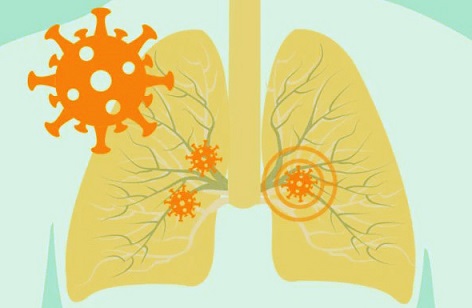The role of oxidative stress and PARP activation in early lung damage in COVID-19
Nikhil Prasad Fact checked by:Thailand Medical News Team Oct 07, 2024 1 year, 3 months, 1 week, 3 days, 12 hours, 25 minutes ago
Medical News: A recent study sheds light on early lung damage mechanisms in COVID-19 pneumonia, pointing to the role of oxidative stress and poly(ADP-ribose) polymerase (PARP) activation. Conducted by a team of international researchers from the University of Debrecen in Hungary and Newcastle University in the UK, the study provides valuable insights into how the virus affects the lungs, potentially leading to worse outcomes, particularly in males. This
Medical News report dives deeper into the findings, which could lead to new therapeutic strategies for COVID-19.
 The role of oxidative stress and PARP activation in early lung damage in COVID-19
What is Oxidative Stress and PARP Activation?
The role of oxidative stress and PARP activation in early lung damage in COVID-19
What is Oxidative Stress and PARP Activation?
Oxidative stress is a condition where the body produces excessive free radicals that damage cells. In the lungs, this can cause inflammation, tissue damage, and worsen lung diseases. PARP activation, meanwhile, is a cellular process triggered by DNA damage, often due to oxidative stress. When activated, PARP helps repair damaged DNA, but in cases of overactivation, it depletes cellular energy, causing further tissue damage.
In previous studies, oxidative stress and PARP activation were found in various diseases, including COVID-19. The researchers behind this study expanded their investigation to better understand how these mechanisms contribute to the lung damage seen in COVID-19 patients.
Key Findings from the Study
This study was a retrospective investigation of lung tissue samples from patients who had died of COVID-19. The patients, treated at the Sátoraljaújhely Erzsébet Hospital in Hungary, were stratified into different stages of the disease, including the exudative and proliferative phases.
The key findings of the study were as follows:
-Oxidative Stress and PARP Activation Peak Early: The researchers found that oxidative stress and PARP activation were at their highest during the exudative phase of COVID-19, which is the early stage of lung inflammation. The levels then decreased during the proliferative phase when the lungs attempt to repair themselves.
-Correlation with Tissue Damage: The study showed that pulmonary oxidative stress and PARP activation were linked to markers of liver and kidney damage, oxygen transport abnormalities, and blood clotting issues. These correlations were most evident during the exudative phase. Interestingly, the viral load in the lungs also correlated with oxidative stress, but to a lesser extent. This suggests that oxidative stress can occur independently of the virus, contributing to lung damage on its own.
-Gender Differences: One of the most striking findings was the difference in outcomes between males and females. While there was no significant difference in oxidative stress or PARP activation between genders at death, males who died of COVID-19 were on average 15 years younger than females. The time of hospitalization was
inversely related to the level of PARP activation in males, suggesting that higher PARP activity contributed to a quicker and more severe decline in their health.
-Independent Pathways of Damage: The study indicated that while both oxidative stress and the virus were associated with increased PARP activation, they were not directly related to each other. This implies that these two pathways might independently cause the same tissue damage, leading to a more complex understanding of how COVID-19 impacts the body.
Implications for Treatment
Given the role of PARP activation in lung damage, the researchers suggest that repurposing existing PARP inhibitors, drugs that block PARP activity, could be beneficial in treating acute COVID-19. These inhibitors could potentially reduce tissue damage in the lungs by limiting the overactivation of PARP, preserving cellular energy, and preventing the cascading effects of inflammation and damage.
PARP inhibitors are already used in cancer therapy, where they help stop cancer cells from repairing their DNA, leading to cell death. In COVID-19, the idea would be to use these drugs early in the infection to protect lung tissue from irreversible damage. This could also have long-term benefits, reducing the severity of post-COVID complications that many patients experience.
Further Research Needed
While the findings are promising, this was a retrospective study with some limitations. The researchers were not able to fully account for other factors such as underlying health conditions or lifestyle choices that might have affected the results. For example, oxidative stress and PARP activation can be influenced by factors like age, obesity, and smoking, which were not controlled for in this study.
Additionally, the timing of blood sample collection varied among patients, which may have impacted the accuracy of the correlations observed. Despite these limitations, the study builds a strong case for further investigation into the use of PARP inhibitors as a treatment for COVID-19.
Conclusion
This article highlights the early lung damage caused by oxidative stress and PARP activation in COVID-19, with males showing worse outcomes due to higher levels of PARP activity. The study suggests that using PARP inhibitors could be a promising strategy for preventing severe lung damage in COVID-19 patients.
The study findings were published in the peer-reviewed British Journal of Pharmacology.
https://papers.ssrn.com/sol3/papers.cfm?abstract_id=4970585
For the latest COVID-19 News, keep on logging to Thailand
Medical News.
Read Also:
https://www.thailandmedical.news/news/covid-19-is-not-mild-as-most-will-develop-lung-fibrosis-10-percent-of-all-lung-transplants-in-u-s-now-go-to-post-covid-patients
https://www.thailandmedical.news/news/the-uniqueness-of-post-covid-lung-fibrosis-the-increased-expression-of-atp12a-protein
https://www.thailandmedical.news/news/long-term-lung-healing-even-after-mild-or-moderate-covid-19-many-could-develop-lung-fibrosis
